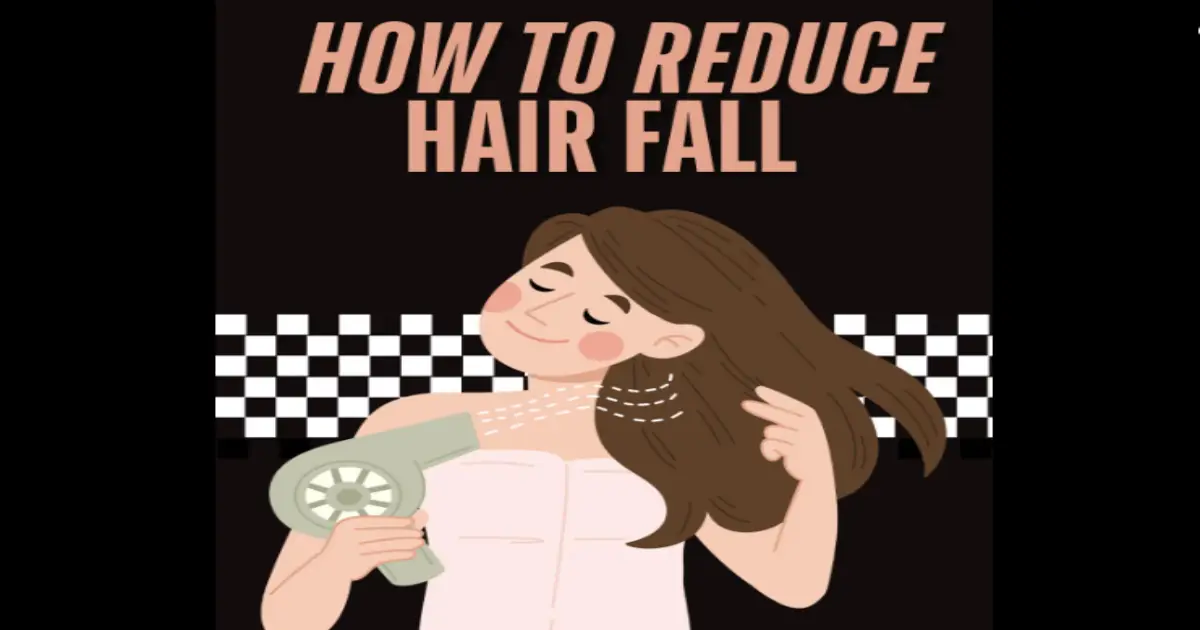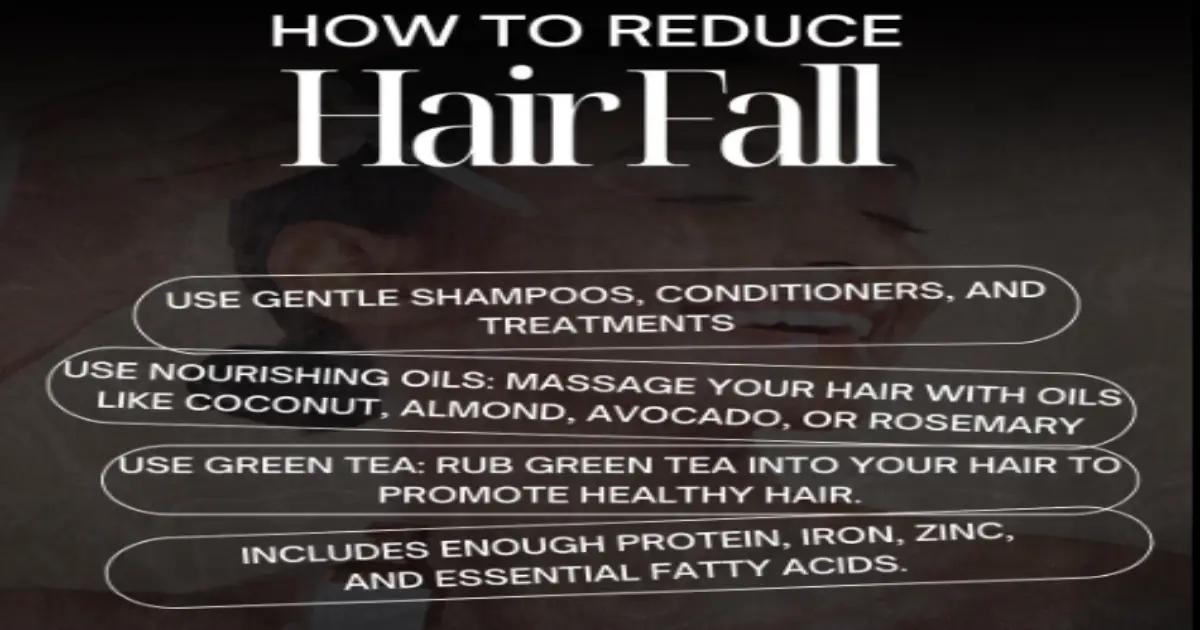Did you know that nearly 70% of people experience hair fall at some point in their lives? If you’re struggling with hair loss, you’re not alone. Whether it’s due to stress, genetics, or lifestyle choices, losing hair can be distressing. But the good news is that there are effective and natural ways to stop hair loss. In this guide, we’ll explore the best tips to reduce hair fall, backed by research and expert recommendations.
What Is Hair Fall & Why Does It Happen?
Hair fall refers to the excessive shedding of hair from the scalp, leading to thinning and possible bald patches. On average, people lose 50-100 hairs daily, which is normal. However, when the loss exceeds this rate, it’s a cause for concern.
Common Causes of Hair Fall
- Genetics (Androgenetic Alopecia): Male and female pattern baldness.
- Nutritional Deficiencies: Lack of iron, biotin, or protein.
- Hormonal Imbalance: Pregnancy, menopause, thyroid disorders.
- Stress & Lifestyle Factors: Poor sleep, high stress, and smoking.
- Hair Treatments & Heat Styling: Excessive use of dyes, chemicals, and heating tools.
- Environmental Factors: Pollution, hard water, and sun exposure can weaken hair strands.
- Medical Conditions: Conditions like alopecia areata, scalp infections, and autoimmune disorders can contribute to hair loss.
Why Is Preventing Hair Fall Important?
Taking care of your hair early on can:
- Prevent premature baldness.
- Boost self-confidence.
- Ensure healthy, strong, and shiny hair.
- Reduce scalp issues like dandruff and infections.
- Promote better hair regrowth by maintaining a nourished scalp.
The Best Tips to Reduce Hair Fall Naturally

1. Maintain a Nutrient-Rich Diet
Your diet plays a vital role in hair health. Include:
- Protein-rich foods (Eggs, lean meats, lentils, tofu)
- Iron-rich foods (Spinach, red meat, chickpeas, pumpkin seeds)
- Omega-3 fatty acids (Fish, walnuts, flaxseeds, chia seeds)
- Biotin & Vitamin B complex (Nuts, whole grains, dairy products)
- Vitamin C-rich foods (Oranges, bell peppers, strawberries) to improve iron absorption
- Zinc & Selenium (Pumpkin seeds, Brazil nuts) to maintain healthy hair follicles
2. Use Gentle Hair Care Practices
- Wash hair with mild, sulfate-free shampoos 2-3 times a week.
- Avoid excessive heat styling and harsh chemical treatments.
- Use a wide-tooth comb to prevent breakage.
- Dry hair naturally instead of using heat-based drying methods.
- Avoid tight hairstyles like ponytails and braids that put stress on hair roots.
3. Massage Your Scalp Regularly
Scalp massages improve blood circulation and stimulate hair growth. Use:
- Coconut oil – Strengthens hair and prevents protein loss.
- Castor oil – Rich in ricinoleic acid, promoting growth.
- Rosemary essential oil – Clinically proven to improve hair thickness.
- Amla oil – High in vitamin C, boosts hair regeneration.
4. Reduce Stress with Relaxation Techniques
- Practice yoga & meditation to lower cortisol levels.
- Get enough sleep (7-8 hours per night) to aid hair regeneration.
- Exercise regularly to enhance blood flow to the scalp.
- Try aromatherapy with calming oils like lavender and chamomile.
5. Stay Hydrated
Water keeps the hair shaft moisturized and healthy. Aim for 8-10 glasses of water daily to prevent dryness and breakage.
6. Try Herbal Remedies
- Aloe Vera: Strengthens roots and soothes the scalp.
- Onion Juice: Boosts keratin production for regrowth.
- Green Tea Rinse: Contains antioxidants that reduce hair fall.
- Hibiscus Flower Paste: Nourishes hair and prevents thinning.
- Fenugreek Seeds Mask: Rich in protein and nicotinic acid, strengthens roots.
7. Avoid Smoking & Alcohol
Smoking restricts blood flow to hair follicles, while excessive alcohol intake depletes vital nutrients like zinc and iron.
8. Consider Supplements (Consult a Doctor First)
- Biotin: Supports keratin production.
- Vitamin D: Helps stimulate new hair follicles.
- Iron & Zinc: Essential for hair growth.
- Collagen Supplements: Strengthen hair structure and elasticity.

Common Myths & Misconceptions About Hair Fall
Myth: Cutting Your Hair Frequently Stops Hair Fall
✅ Fact: Trimming only removes split ends; it doesn’t affect hair growth.
Myth: Shampooing Daily Causes More Hair Loss
✅ Fact: Washing hair removes dirt and excess oil; however, using harsh shampoos too frequently can lead to damage.
Myth: Stress Alone Causes Baldness
✅ Fact: While stress contributes to hair fall, genetics and diet play a more significant role.
Myth: Hair Oiling Increases Hair Fall
✅ Fact: Oiling nourishes the scalp, but excessive oil left on the scalp for too long can attract dust and clog follicles.
How to Regrow Hair: Step-by-Step Guide
1️⃣ Improve Your Diet: Consume nutrient-rich foods for healthy hair growth.
2️⃣ Use Hair Growth Oils: Apply coconut, castor, or rosemary oil regularly.
3️⃣ Massage the Scalp: Boosts circulation and stimulates hair follicles.
4️⃣ Limit Heat & Chemicals: Reduce exposure to harsh treatments.
5️⃣ Stay Hydrated: Drink enough water daily.
6️⃣ Use Herbal Treatments: Aloe vera, onion juice, and fenugreek seeds can promote regrowth.
Comparison Table: Natural vs. Medical Hair Fall Treatments
| Treatment Type | Effectiveness | Cost | Best For |
|---|---|---|---|
| Diet & Nutrition | High | Low | General Hair Health |
| Herbal Oils & Massages | Moderate | Low | Mild Hair Loss |
| Minoxidil (Rogaine) | High | Moderate | Genetic Hair Loss |
| PRP Therapy | High | Expensive | Moderate to Severe Hair Loss |
| Hair Transplant | Very High | Expensive | Severe Hair Loss |
The Role of Hormones in Hair Fall
Hormones play a significant role in hair health. Any imbalance can lead to excessive hair shedding.
Hormonal Causes of Hair Fall
- Dihydrotestosterone (DHT): A byproduct of testosterone that causes hair follicles to shrink, leading to male and female pattern baldness.
- Thyroid Imbalance: Hypothyroidism and hyperthyroidism can disrupt hair growth cycles.
- Menopause & Pregnancy: Fluctuations in estrogen and progesterone levels can cause temporary or permanent hair loss.
- Polycystic Ovary Syndrome (PCOS): Excess androgens in women can trigger hair thinning and loss.
How to Balance Hormones for Hair Health
- Include phytoestrogens like flaxseeds and soy in your diet.
- Exercise regularly to maintain a healthy endocrine system.
- Consult a doctor for hormone-regulating treatments if needed.
Hair Care Routine for Stronger, Healthier Hair
A consistent and effective hair care routine can prevent hair fall and boost hair growth.
Daily Hair Care Habits
- Morning: Gently comb hair with a wide-tooth comb to prevent breakage.
- Washing: Use lukewarm water and a sulfate-free shampoo to clean the scalp without stripping natural oils.
- Conditioning: Apply conditioner only to the hair lengths, not the roots.
- Oiling: Massage scalp with coconut, castor, or rosemary oil twice a week.
- Night Routine: Use a silk pillowcase to reduce friction and prevent hair breakage.
Best Hairstyles to Prevent Hair Damage
Some hairstyles put unnecessary tension on hair strands, leading to traction alopecia (a type of hair loss caused by excessive pulling).
Safe Hairstyles for Reducing Hair Fall
✔ Loose braids or low buns to prevent tension on the scalp.
✔ Silk or satin scrunchies instead of elastic bands.
✔ Avoid tight ponytails and harsh updos that cause breakage.
DIY Hair Masks for Hair Fall Control
Homemade hair masks nourish the scalp and strengthen hair follicles naturally.
1. Aloe Vera & Coconut Oil Mask
🌿 Ingredients: 2 tbsp aloe vera gel + 1 tbsp coconut oil
🌀 How to Use: Apply on the scalp, leave for 30 minutes, then wash.
2. Onion Juice & Honey Mask
🧅 Ingredients: 2 tbsp onion juice + 1 tsp honey
🌀 How to Use: Apply on scalp, leave for 20 minutes, then rinse.
3. Fenugreek & Yogurt Mask
🌾 Ingredients: 2 tbsp soaked fenugreek seeds (blended) + 2 tbsp yogurt
🌀 How to Use: Apply for 30 minutes, then wash off with mild shampoo.
The Impact of Seasonal Changes on Hair Fall
Hair shedding increases during monsoon and winter due to changes in humidity and temperature.
How to Prevent Seasonal Hair Fall
- Keep the scalp clean to prevent fungal infections.
- Use anti-frizz serums in humid weather.
- Apply deep conditioning treatments in winter to combat dryness.
The Role of Hormones in Hair Fall
Hormonal imbalances can trigger excessive hair shedding. Some key hormones affecting hair health include:
Hormones That Contribute to Hair Fall
- DHT (Dihydrotestosterone): Causes follicle shrinkage, leading to male and female pattern baldness.
- Thyroid Hormones: Hypothyroidism and hyperthyroidism can cause hair thinning.
- Estrogen & Progesterone: Imbalances during pregnancy, menopause, or PCOS can lead to hair loss.
- Cortisol: High-stress levels increase cortisol, disrupting hair growth cycles.
How to Balance Hormones Naturally
- Eat a diet rich in omega-3 fatty acids and antioxidants.
- Manage stress through meditation, yoga, and deep breathing exercises.
- Get enough sleep and regular exercise to maintain hormonal health.
- Consult a doctor for hormone therapy if needed.
Seasonal Hair Fall: How Weather Affects Your Hair
Changes in temperature and humidity can impact hair growth. Here’s how:
How Different Seasons Affect Hair Health
- Summer: Excessive sun exposure dries out hair and weakens roots.
- Monsoon: Increased humidity leads to frizziness and fungal scalp infections.
- Winter: Dry air causes scalp dryness, leading to breakage and dandruff.
Tips to Reduce Seasonal Hair Fall
✔ In summer, wear a hat or scarf to protect hair from UV damage.
✔ During monsoon, keep the scalp clean and dry to avoid infections.
✔ In winter, apply deep conditioning treatments to retain moisture.
Hair Masks for Stronger, Healthier Hair
Natural hair masks can nourish the scalp and strengthen hair follicles.
DIY Hair Masks for Hair Growth
1️⃣ Aloe Vera & Coconut Oil Mask – Soothes scalp and strengthens hair.
2️⃣ Onion Juice & Honey Mask – Boosts keratin production.
3️⃣ Fenugreek & Yogurt Mask – Rich in proteins and helps in hair regrowth.
4️⃣ Egg & Olive Oil Mask – Provides deep nourishment.
5️⃣ Hibiscus & Amla Mask – Prevents premature graying and strengthens roots.
🌀 How to Use: Apply the mask, leave it for 30-40 minutes, then wash with a mild shampoo.
The Best Hairstyles to Prevent Hair Damage
Some hairstyles put unnecessary tension on hair, causing traction alopecia.
Hairstyles That Prevent Hair Breakage
✔ Loose braids or low buns to prevent pulling on roots.
✔ Use silk or satin scrunchies instead of tight rubber bands.
✔ Avoid tight ponytails and high buns that stress the scalp.
✔ Let your hair down occasionally to relieve tension.
Hair Supplements: Do They Really Work?
Hair supplements can fill nutritional gaps and improve hair health.
Essential Hair Supplements
- Biotin (Vitamin B7): Strengthens hair and supports keratin production.
- Vitamin D: Helps regenerate hair follicles.
- Iron & Zinc: Prevents hair thinning.
- Collagen Peptides: Promotes stronger hair strands.
💡 Tip: Always consult a doctor before taking supplements to avoid overdosing.
Frequently Asked Questions About Hair Fall
What is the best way to reduce hair fall naturally?
A: A balanced diet, regular scalp massages, and avoiding harsh hair treatments are key.
How can I stop hair loss in males?
A: Men should focus on biotin intake, scalp massages, and consider DHT-blocking shampoos.
How can women prevent hair thinning?
A: Women should maintain hormonal balance, reduce stress, and use nutrient-rich hair masks.
Can hair loss be reversed?
A: Yes, in many cases, proper nutrition and hair care routines can promote regrowth.
What shampoo is best for hair fall?
A: Sulfate-free, mild shampoos with biotin, keratin, and caffeine are best.
Final Thoughts on Reducing Hair Fall
✅ Hair fall is common but manageable with the right strategies.
✅ A healthy diet, proper hydration, and scalp care can prevent excessive hair loss.
✅ Stress management plays a vital role in maintaining strong and healthy hair.
✅ Consult a dermatologist if hair fall persists despite following these tips.
💡 Want more expert hair care advice? Subscribe to our newsletter!










Nice Post. Its very helpful.